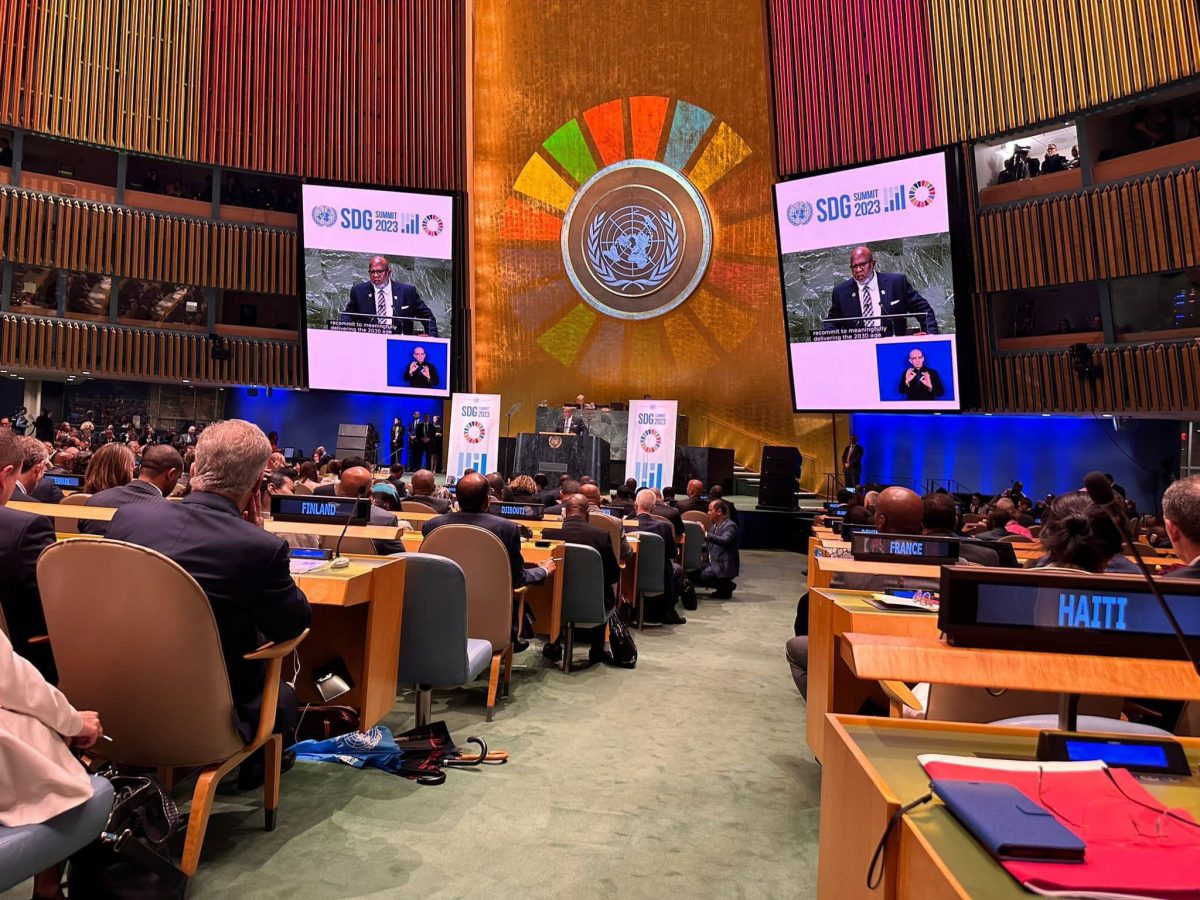Declaring it a crisis point which he said has significantly derailed the achievement of the Sustainable Development Goals (SDGs), President Irfaan Ali said that “be it food, energy, climate [or] the destabilizing impact of the COVID-19 pandemic,” the combined effect of those crises has hindered the achievement of the goals.
The Guyanese Head-of-State was at the time addressing a High-Level Political Forum on Sustainable Development at the 78th Session of the United Nations General Assembly in New York yesterday, where he stressed the importance of global partnerships.
Ali said that “a major part of the problem is the lack of progress with Goal 17 on global partnerships and the failure of the international community to deliver on its commitments” to developing countries.
He told the gathering of heads of governments and other dignitaries, that “the increased cost of financing, rising debt to gross domestic product (GDP) and unsustainable balance sheets have placed the developing world in a precarious position.”
The Guyanese President commended to the Assembly, however, what he said would have to be the matching of not only national efforts to commitments made, but those also being delivered by the international community; if the goals are to be achieved.
He told the Assembly that it was meeting at a mid-point of the implementation of Agenda 2030 “in a crisis.”
Ali opined, “we will not have a world where everyone everywhere enjoys their full human rights, peace and security, and is free from poverty and hunger, unless the right to development is realized and respected.”
Against this background, he said Guyana believes that significant progress can only be made in achieving the SDGs “if national efforts are matched by commitments being fulfilled, and if an international environment is created that fosters progress for all countries.”
Critical to this he said, is action on the “Bridgetown Initiative, liquidity support, debt sustainability, development funding and governance reforms of international financial institutions.”
Underscoring the precarious position in which he said the developing world had been placed, Ali cited examples which he credited to a recent IDB report, of the gap in financing to achieve four critical SDGs for Latin America and the Caribbean (LAC).
These he said, include access to water and sanitation, energy, building infrastructure that promotes sustainable industrialization and innovation, and making cities sustainable, which would require some $2.2 trillion dollars.
He said that additionally, the debt-to-GDP ratio in the LAC region in 2022 was 117%, and inflation stood at 9.2%, noting that this was the situation of just one region of the world.
He said that “Guyana’s expansion of our economy has allowed us to focus heavily on the SDGs.”
He said that for example, investment per capita in health has increased by 62%, education 64%, and security by 153% over a three-year period.
“But national commitment alone will not be enough to achieve the SDGs, especially for the poorest and most vulnerable.”
A major part of the problem is the lack of progress with Goal 17 on global partnerships and the failure of the international community to deliver on its commitments” Ali said.
On this point he said that “international financial commitments, be it the 0.7% of Gross National Product for ODA – a commitment made 50 years ago – or the one hundred billion dollars annually under the Paris Agreement to developing countries, among others, have not been met.”
He added that further to that, “our international financial architecture is out of sync with the needs of developing countries and must be reformed.”
“Developing countries are faced with higher food inflation – 5% higher than the rest of the world in most cases. To compound this, for developing countries, the average interest on external borrowing is three times higher than that of developed countries”, he said.
Ali stressed that to counter these constraints there must be progress on global partnerships and the international community must deliver on its commitments to developing countries.






